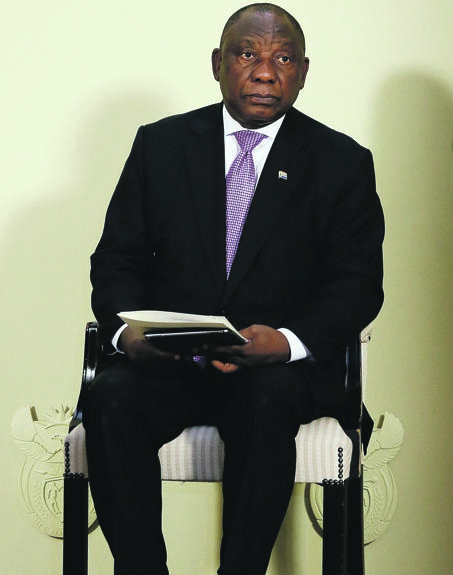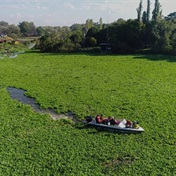
The position was originally expected to go to eSwatini, but ‘capacity constraints’ meant the country could not fulfil this duty, say state officials
President Cyril Ramaphosa has admitted that the decision to elect South Africa to chair the African Union (AU) in 2020 caught him by surprise.
“It is totally unexpected,” he told journalists on the sidelines of the 32nd AU heads of state summit on Monday, where it was announced that South Africa would fill the year-long position, which rotates between the African regions.
In the run-up to the summit, it was expected that eSwatini (formerly Swaziland) would fill the position.
Its officials, however, made a desperate plea to South Africa 48 hours before the Southern African Development Community (SADC) met to finalise the absolute monarchy’s candidacy.
They cited “capacity constraints” as the reason eSwatini could not fulfil this duty, according to government officials with knowledge of the meeting.
It isn’t clear what these were, but the country’s former finance minister, Martin Dlamini, last year admitted the kingdom was broke. eSwatini would, however, still host the mid-year meeting of the AU, but the South African government has agreed to provide assistance with security and logistics arrangements.
King Mswati III did not attend this week’s summit, and sent his new prime minister, Ambrose Dlamini, in his place.
Unlike Madagascar’s newly elected president, Andry Rajoelina, and the Democratic Republic of Congo’s new president, Felix Tshisekedi, Dlamini did not speak at the summit because he is not eSwatini’s head of state.
South Africa last chaired the AU in 2002 – former president Thabo Mbeki had the position. The last time a country from the SADC chaired the AU (2015), former Zimbabwean president Robert Mugabe was at the helm.
South Africa’s stepping up next year again for SADC’s next rotation means that the biggest economy in the region has had more turns at the helm than any of the other 13 member countries of the region.
eSwatini would, however, still host the mid-year AU gathering, which was announced in 2015, but the R4.8 billion the tiny kingdom has poured into building massive conference facilities for this meeting might already have gone to waste.
Under recent reforms, the AU has scaled down its mid-year meetings from full summits requiring massive infrastructure and hotel rooms for heads of state to a more streamlined, functional meeting of officials, called a “mid-year coordination session”.
Already, this year’s gathering in Niamey, Niger, will be such a session, with the next full AU heads of state summit only taking place in January next year.
eSwatini’s foreign ministry harshly criticised false reports in the local media that South Africa would host next year’s mid-year session.
Joel Nhleko, the principal secretary of the department, on Thursday said: “Until the kingdom wishes or decides to rescind its offer to host the Coordination Summit in 2020, for whatever reason, the assembly decision of 2015 [that eSwatini would host the summit] will not change.”
He said the negotiations for chairing the AU happened “with full decorum and understanding among member states of the respective blocs”.
Ramaphosa said South Africa was “honoured” to be elected to become AU chair in 2020.
“We are deeply humbled,” he told journalists, adding: “We didn’t expect that we would be asked to perform this role, but because it is a duty that we need to perform, we take it on our shoulders with the greatest humility, and we are pleased that there is a level of confidence that the continent is investing in us as South Africa to be able to lead the continent in 2020.”
Egypt’s President Abdel Fattah al-Sisi is this year’s chair.
While Rwandan President Paul Kagame pushed for a stronger AU, other countries prefer a weaker AU that does not interfere in their domestic politics and problems.
In the likely event that he is still in charge after South Africa’s May 8 general elections, Ramaphosa is expected to be the person who fills the chair next year.
This position also coincides with South Africa’s two-year temporary membership of the UN Security Council, which officials said would help when there were issues on the continent that needed to be raised with the international body.
Next year also marks the deadline for “silencing the guns in Africa”.
Even though this is unlikely to happen, South African officials are said to be mulling this over as a theme for its chairing of the AU, just like Kagame pushed AU reforms and the Africa Continental Free Trade Area during Rwanda’s chairing of the body last year.
Peace in Africa by 2020 was one of the goals of the AU’s Agenda 2063, championed by former AU Commission chairperson Nkosazana Dlamini-Zuma.
International Relations and Cooperation Minister Lindiwe Sisulu wrote in an op-ed on Friday in the Daily Maverick that “South Africa will build on the work of previous chairs by accelerating actions aimed at contributing to a conflict-free Africa and end all wars on the continent by 2020”.
South Africa’s position on the UN Security Council would also provide it “with a unique opportunity to leverage the capacity of the UN to contribute towards ending conflicts on the continent”.
It would also promote cooperation between the UN and the AU, she wrote.




 Publications
Publications
 Partners
Partners








